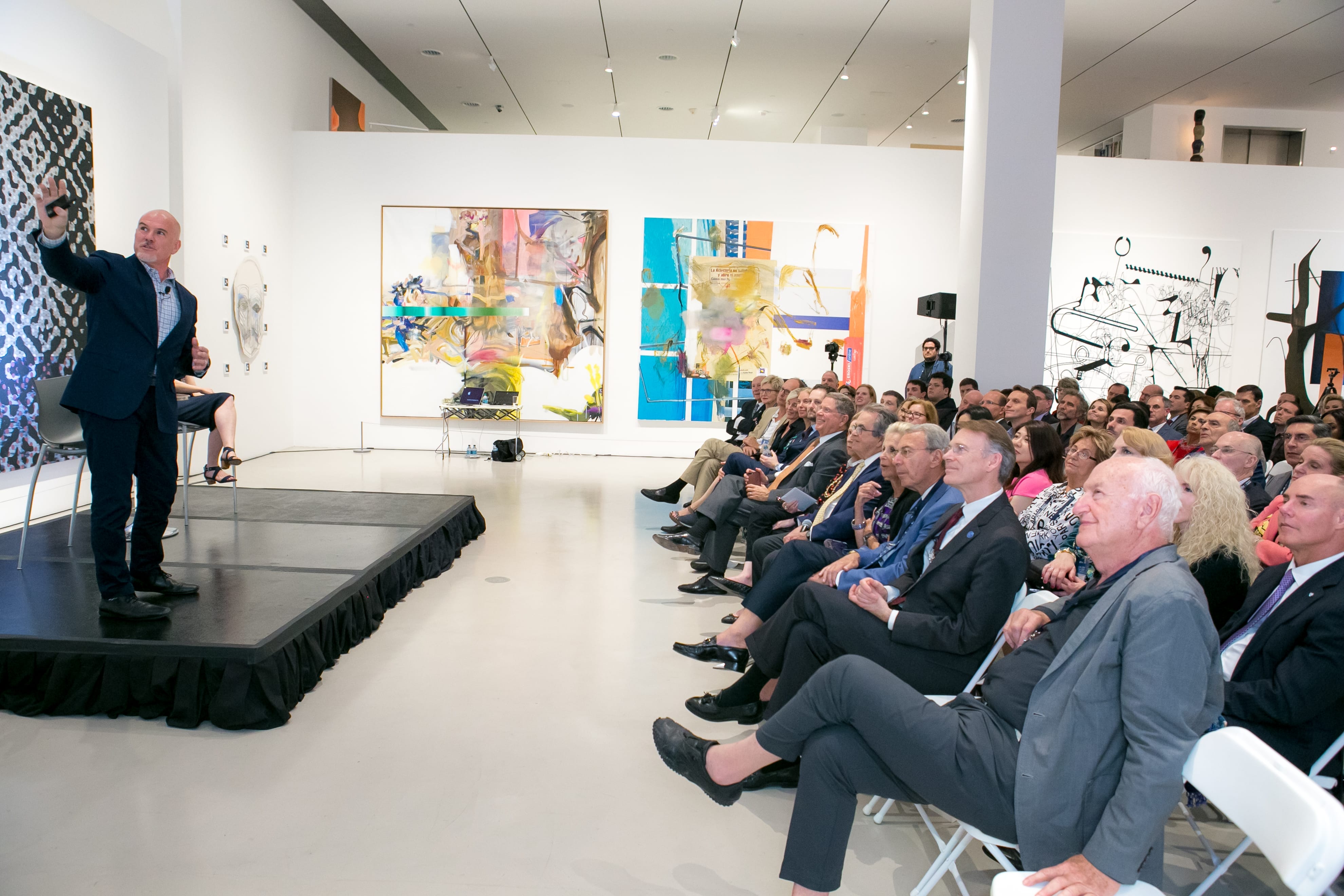“Brain science and art—no one can say Wharton is narrow,” said Andrew Heller, WG79, co-chair of the Wharton Global Forum in Miami following the event’s opening keynote. He referred to the reception hosted by Honorary Chairman Carlos de la Cruz, Sr. W62 WG63 at his eponymous art gallery.
More than 400 alumni, professors, and business leaders attended the 49th Wharton Global Forum in Miami from Thursday, March 9 to Saturday, March 11. The event began with a dialogue between Alberto Ibarguen L74 president and CEO of Knight Foundation, and Noah Horowitz, director of the Americas for Art Basel, on the impact of art as a growth tool in Miami, and culminated in an interactive art and neuroscience session led by Michael Platt GR94, a Penn Integrates Knowledge professor who studies the intersection of economics, psychology, and neuroscience, and his colleague Elizabeth Johnson.
The organizers planned keynotes and panels that showcased broad business and economic topics, including the eclectic opening night reception that combined contemporary art with brain monitors to gauge response to art. Themes such as data analytics, sports business, the new economy, and politics—including a closed panel on Mexico—showcased the breadth of Wharton thought leadership.
Global Forum in a Global City
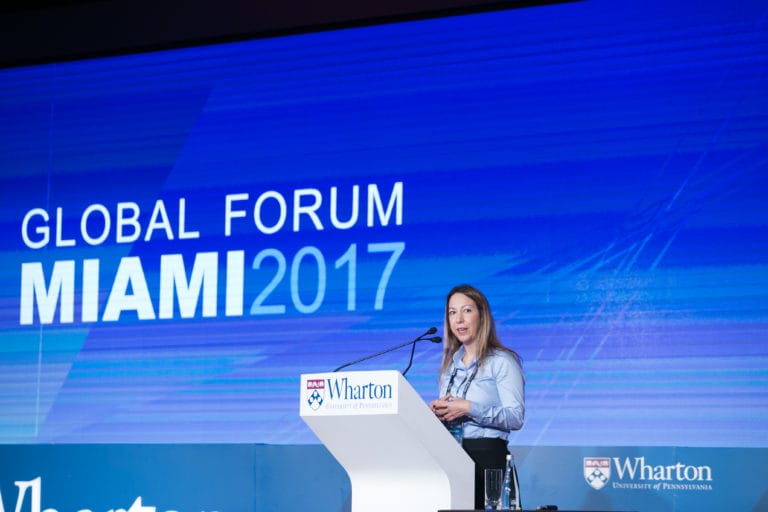
Sonia Rodriguez, W93, president of the Wharton Alumni Club of South Florida, hosting the Forum.
“It’s the place for alumni to get their intellectual candy,” said Sonia Rodriguez W93, an organizing committee member who served as co-master of ceremonies for the Forum. “When we attend Global Forums, we get reignited by faculty and the value these professors bring to the world and students. The heads of corporations share insights you couldn’t get anywhere else.”
It was 80 degrees and sunny in Miami while it was snowing back at Wharton in Philadelphia, but the weather was just one of the many reasons Wharton decided to bring the Forum back to Miami—only one of two cities to host the event in the United States (along with San Francisco) and the only one to host two.
“Miami is a global city and the timing could not have been better. There’s so much change, so much development, so much cultural diversity,” said Rodriguez, a commercial realtor who is president of the Wharton Alumni Club of South Florida.
Miami resident Uhriel Edgardo Bedoya G03 WG03 said the event was a “must-attend” for him. “In many ways, Miami is seen as the capital of Latin America,” said Bedoya, who also attended the 2014 Forum in his home country of Panama. “But the Forums are now more global in nature. There are attendees from all over the world.”
Miami Forum attendees traveled from 20+ different countries, while recent Forum destinations have included Kuala Lumpur, Amsterdam, Bangkok, Panama, and Beijing. Held in Hong Kong, the next Forum will be Wharton’s 50th event.
Eclectic and Dynamic Content
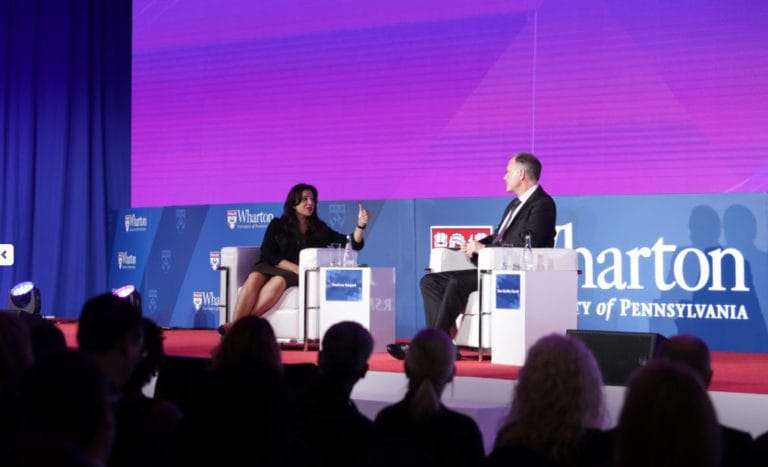
Reshma Saujani, Founder and CEO of Girls Who Code, with Dean Geoffrey Garrett.
The opening plenary on Saturday was a conversation between Dean Geoffrey Garrett and Reshma Saujani, CEO of Girls Who Code, on the skills gap in the U.S. labor market and the role of higher education.
“Technology is the great equalizer,” Saujani said, making a persuasive case for all younger people to learn coding.
During a day of concurrent lifelong learning sessions, the off-the-record panel on the evolving U.S./Mexico relationship was one of the most talked-about and attended, while one of the highest profile moments was the Saturday evening keynote on impact investing.
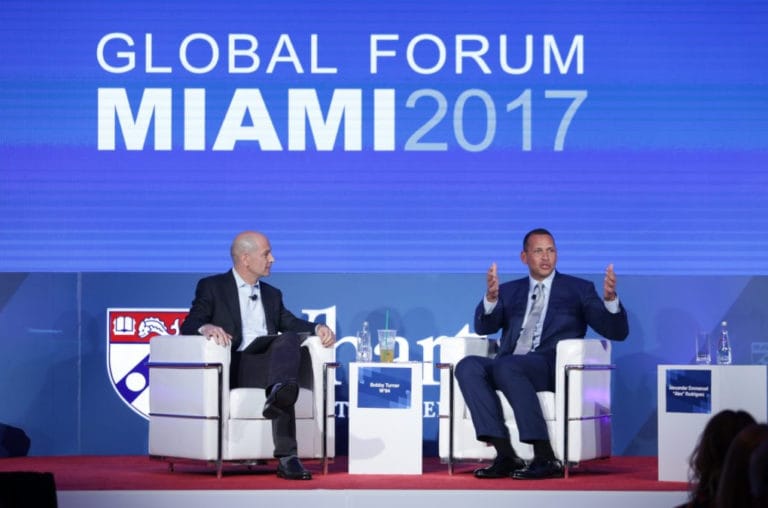
Bobby Turner, chairman/CEO of Turner Impact Capital, and Alex Rodriguez, founder/CEO of A-ROD Corp.
The impact investing discussion was a dialogue between Bobby Turner W84, chairman and CEO of Turner Impact Capital, and Alex Rodriguez, former New York Yankee and founder and CEO of A-ROD Corp. The event brought together Turner’s engaging interview style—one observer called him the “Oprah of Wharton”—with a guest so high profile that the keynote was mentioned on People.com. Turner helped A-ROD Corp. create a plan to give back to the community through impact investing in security, health, and education. Rodriguez stressed the importance of mentors throughout his life. “You’re only as good as your teachers,” he said.
Amit Gupta WG04, CEO of BloomKonnect, mentioned the Turner/Rodriguez event as one of highest value to him because social impact is a cornerstone of his business, a B-to-B marketplace that connects mom-and-pop flower farms in Latin America, Africa, and Europe to U.S. flower resellers with fair-trade pricing. “Bobby’s thoughts on impact investment and doing well while doing good was very interesting to me,” said Gupta.
Gupta also cited strong interest in Robert Sanchez’s talk on Saturday. Sanchez WG93, the chairman and CEO of Ryder Systems, gave a dynamic presentation on how logistics are a window into economic conditions—the “canary in the coal mine of the U.S. economy.” He said that GDP growth under two percent is the biggest limiter to Ryder and other companies’ success and predicted that autonomous trucks would revolutionize logistics within 10 years.
Saturday’s Joe Talks were a newer feature of the Forum, taking place for just the second time. Modeled after TED Talks and named for Joseph Wharton, the rapid-fire series featured intense lectures from four Wharton professors—Eric Bradlow, Mauro Guillen, Laura Huang, and Michael Platt.
“We heard about new and innovative work that the faculty is doing. Both alumni and non-alumni found it very impacting,” said Sonia Rodriguez. “We could have gone on for four more hours.”
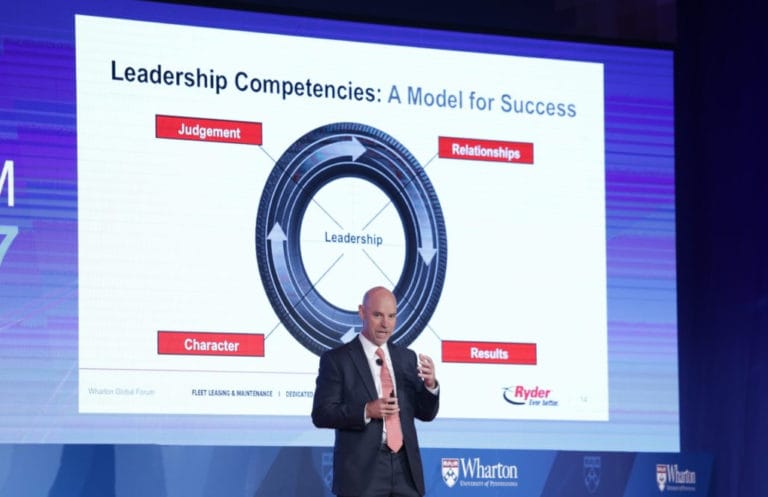
Robert Sanchez, WG93, Chairman and CEO of Ryder System, on disruption in the logistics industry.
Connections Across Programs and Industries
Aside from the panels, making connections and rekindling friendships were unanimous highlights, both at the sessions and at Saturday’s salsa-infused evening gala.
“I saw classmates I hadn’t connected with in years,” said Uhriel Bedoya. “It’s different from a reunion because you’re networking with people from all over the world. The Forum brings together alumni from all programs, and that’s really useful because you don’t often connect.”
Bedoya, who is currently a director of client services for Visa, described how he ran into a former client from his previous job at a Canadian bank. They had known each other for years, but weren’t aware of their shared Wharton connection, with Bedoya getting his MBA through the traditional program and his client through Wharton’s MBA Program for Executives.
Amit Gupta made a few new connections, including Robert Sanchez. “I talked with him after the event and some of the ideas they are using—like an Uber model for trucks—are relevant to us,” he said. “Somebody has to move that box of flowers from the farm to a florist in center city.”
He also met an alumnus with a chip manufacturing company in Taiwan who was working on a new product that could track humidity and temperature for deliveries, and connected with an alumnus in India who was interested in learning about BloomKonnect’s platform with an eye towards licensing it.
“Wharton graduates people working across every industry,” Gupta said. “You meet people who can help you grow your business no matter what kind of business it is—whether flowers or private equity.”
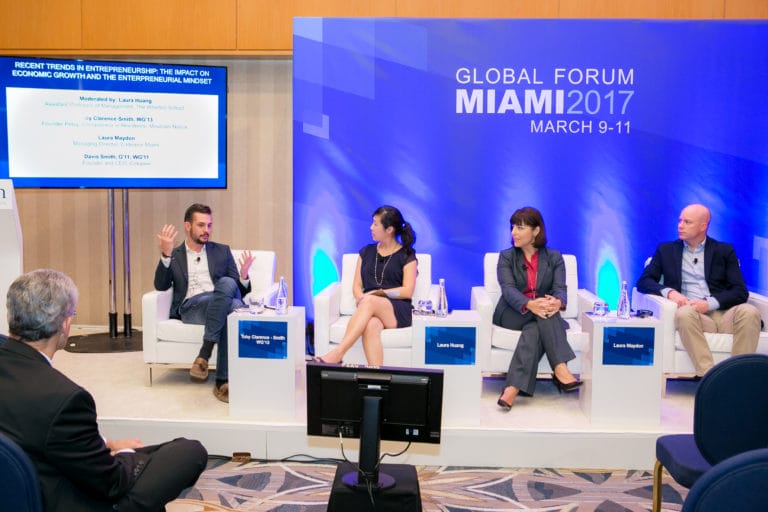
Recent Trends in Entrepreneurship panel with Toby Clarence-Smith WG13, Prof. Laura Huang, Laura Maydon, and Davis Smith WG11 G11.
Toby Clarence-Smith WG13, former CEO and founder of Petsy, one of Mexico’s leading e-commerce companies, found the network more open at Wharton than in sector-specific conferences he attended.
“I noticed that it’s easier to connect with seasoned professionals at the Global Forum,” said Clarence-Smith, who spoke on a panel on the recent trends in entrepreneurship with Prof. Laura Huang and Cotopaxi co-founder Davis Smith, G11 WG11. “When you’re in a Wharton context, industry veterans are much more open to talking to younger people like myself. I had some really interesting chats with people from other sectors that I wouldn’t normally have been able to talk to.”
To sum up the weekend, Bedoya said: “I got everything I wanted out of the Forum, truly. I connected with alums, I made business connections, I went to sessions — I got everything I needed.”
Editor’s note: This post was originally published by the Wharton School as part of their Wharton Stories series. View the original post here. For a full video recap, speaker list, and infographic, visit the Miami Global Forum event site. Wharton Global Forums are the School’s flagship Lifelong Learning program, providing a vital opportunity for alumni, business, government, and academic leaders to come together to discuss and shape international, regional, and industry agendas.
[soundcloud url=”https://api.soundcloud.com/playlists/307168863″ params=”auto_play=false&hide_related=false&show_comments=true&show_user=true&show_reposts=false&visual=true” width=”100%” height=”500″ iframe=”true” /]




















